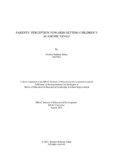| dc.contributor.advisor | Ahmed, Sabrina | |
| dc.contributor.author | Sohan, Hasibur Rahman | |
| dc.date.accessioned | 2021-12-01T06:36:11Z | |
| dc.date.available | 2021-12-01T06:36:11Z | |
| dc.date.copyright | 2021 | |
| dc.date.issued | 2021-08 | |
| dc.identifier.other | ID 16357011 | |
| dc.identifier.uri | http://hdl.handle.net/10361/15682 | |
| dc.description | This thesis is submitted in partial fulfilment of the requirements for the degree of Masters of Science in Early Child Development, 2021. | en_US |
| dc.description | Cataloged from PDF version of thesis. | |
| dc.description | Includes bibliographical references (pages 41-43). | |
| dc.description.abstract | Parents’ dreams and thoughts for their children are the common factors influencing children’s
choices. Every parent wants the best for the children. The influence from parents can end up
into multiple dimensions. The purpose of this study is to explore how the parents in
Bangladeshi context think about their children’s academic future. It aims to understand the
influence of parents’ decision in the future academic goals of the children. Using qualitative
approach this study explains the patterns of thoughts from 19 parents of students across
primary to secondary schools. The study uses FGD and interview as tools for finding the
lenses from parents of an under-served low-income community. These findings are assessed
against the Epstein’s parental involvement framework. Interestingly, the parents from low
income community have minimal expectations while they expressed a big desire to see their
children to the top of the educational process. The tradition of who decides and influence of
elders on the Youngers of the families has been found to a key factor in the influence of how
parental engagement takes place influencing the landmarks for the children’s education. This
study definitely answers the questions on the assumptions, fear and beliefs that lead the
pare4nts to decide their children’s academic future. Further studies are needed to develop
gender based analysis of the context to find what gender-based and cultural factors might
have been there influencing the parents’ decisions. | en_US |
| dc.description.statementofresponsibility | Hasibur Rahman Sohan | |
| dc.format.extent | 50 pages | |
| dc.language.iso | en | en_US |
| dc.publisher | Brac University | en_US |
| dc.rights | BRAC University thesis reports are protected by copyright. They may be viewed from this source for any purpose, but reproduction or distribution in any format is prohibited without written permission. | |
| dc.subject | Epstein’s framework | en_US |
| dc.subject | Parental involvement | en_US |
| dc.subject | Decision making | en_US |
| dc.subject | Academic goals | en_US |
| dc.subject | Perception | en_US |
| dc.subject | Influence | en_US |
| dc.subject.lcsh | Education -- Parent participation | |
| dc.title | Parents’ perception towards setting children’s academic goals | en_US |
| dc.type | Thesis | en_US |
| dc.contributor.department | Institute of Education Development, BRAC University | |
| dc.description.degree | M. Early Child Development | |

